Analysis of Airbnb Success Factors and Hotel Industry Strategies
VerifiedAdded on 2022/10/01
|12
|2965
|80
Report
AI Summary
This report provides an analysis of the success factors contributing to Airbnb's dominance in the accommodation sector, exploring the impact of the sharing economy, disruptive innovation, and consumer demographics. It examines how Airbnb leverages these elements to provide competitive services. The report also investigates the strategies employed by the hotel industry to mitigate Airbnb's influence, focusing on fostering long-term customer loyalty through loyalty programs, enhancing digital connectivity, and adapting to strategic shifts in the market. The analysis covers various aspects, including online platforms, customer engagement, and the application of technological advancements such as blockchain, providing insights into how hotels are responding to the challenges posed by peer-to-peer accommodation services. The report concludes by summarizing the key findings, emphasizing Airbnb's role as a mediator between tourists and owners, its innovative distribution methods, and the importance of trust in the digital environment, while highlighting the importance for hotels to adapt their business models to remain competitive.

AirBNB success
Word count:
Word count:
Paraphrase This Document
Need a fresh take? Get an instant paraphrase of this document with our AI Paraphraser
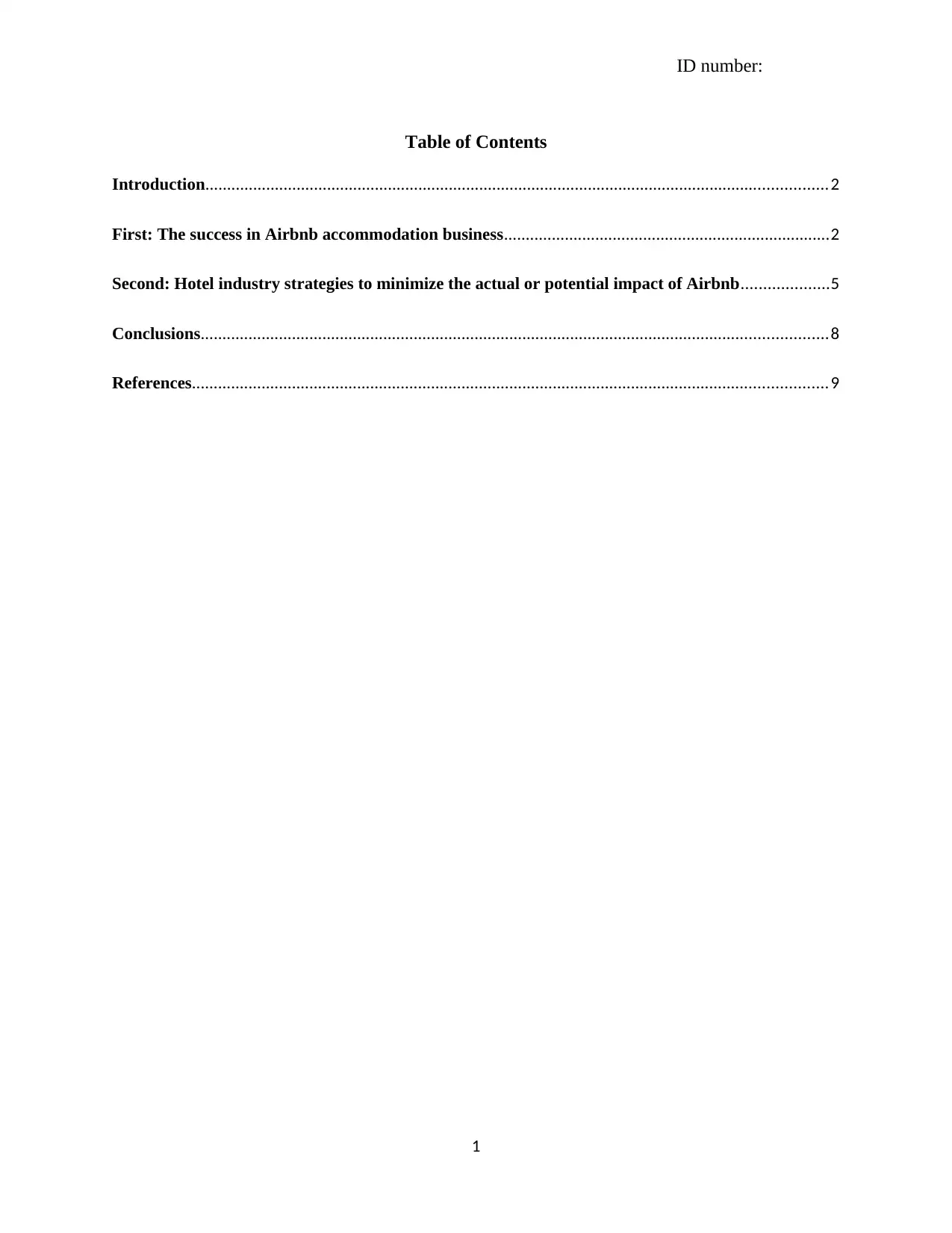
ID number:
Table of Contents
Introduction...............................................................................................................................................2
First: The success in Airbnb accommodation business...........................................................................2
Second: Hotel industry strategies to minimize the actual or potential impact of Airbnb....................5
Conclusions................................................................................................................................................8
References..................................................................................................................................................9
1
Table of Contents
Introduction...............................................................................................................................................2
First: The success in Airbnb accommodation business...........................................................................2
Second: Hotel industry strategies to minimize the actual or potential impact of Airbnb....................5
Conclusions................................................................................................................................................8
References..................................................................................................................................................9
1
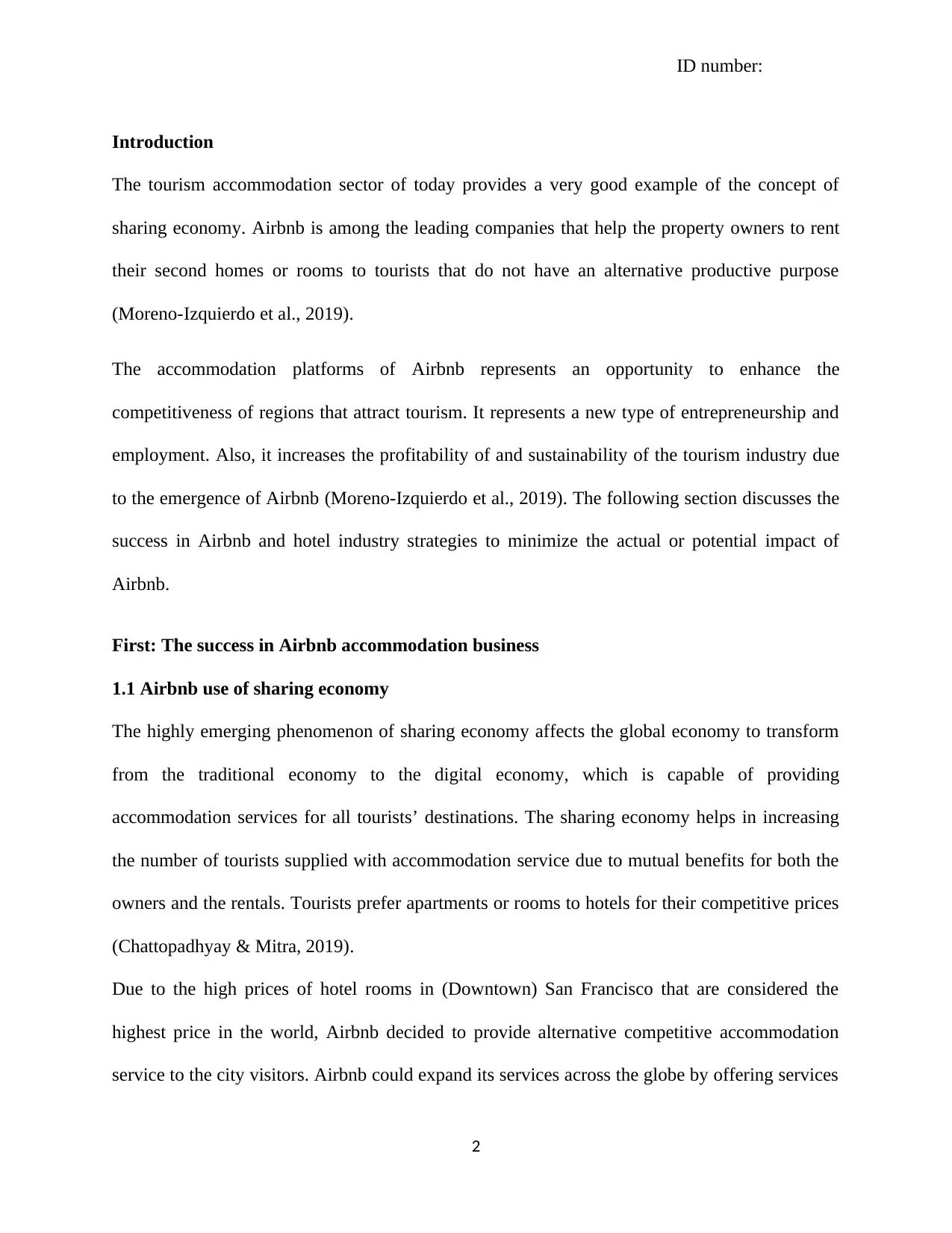
ID number:
Introduction
The tourism accommodation sector of today provides a very good example of the concept of
sharing economy. Airbnb is among the leading companies that help the property owners to rent
their second homes or rooms to tourists that do not have an alternative productive purpose
(Moreno-Izquierdo et al., 2019).
The accommodation platforms of Airbnb represents an opportunity to enhance the
competitiveness of regions that attract tourism. It represents a new type of entrepreneurship and
employment. Also, it increases the profitability of and sustainability of the tourism industry due
to the emergence of Airbnb (Moreno-Izquierdo et al., 2019). The following section discusses the
success in Airbnb and hotel industry strategies to minimize the actual or potential impact of
Airbnb.
First: The success in Airbnb accommodation business
1.1 Airbnb use of sharing economy
The highly emerging phenomenon of sharing economy affects the global economy to transform
from the traditional economy to the digital economy, which is capable of providing
accommodation services for all tourists’ destinations. The sharing economy helps in increasing
the number of tourists supplied with accommodation service due to mutual benefits for both the
owners and the rentals. Tourists prefer apartments or rooms to hotels for their competitive prices
(Chattopadhyay & Mitra, 2019).
Due to the high prices of hotel rooms in (Downtown) San Francisco that are considered the
highest price in the world, Airbnb decided to provide alternative competitive accommodation
service to the city visitors. Airbnb could expand its services across the globe by offering services
2
Introduction
The tourism accommodation sector of today provides a very good example of the concept of
sharing economy. Airbnb is among the leading companies that help the property owners to rent
their second homes or rooms to tourists that do not have an alternative productive purpose
(Moreno-Izquierdo et al., 2019).
The accommodation platforms of Airbnb represents an opportunity to enhance the
competitiveness of regions that attract tourism. It represents a new type of entrepreneurship and
employment. Also, it increases the profitability of and sustainability of the tourism industry due
to the emergence of Airbnb (Moreno-Izquierdo et al., 2019). The following section discusses the
success in Airbnb and hotel industry strategies to minimize the actual or potential impact of
Airbnb.
First: The success in Airbnb accommodation business
1.1 Airbnb use of sharing economy
The highly emerging phenomenon of sharing economy affects the global economy to transform
from the traditional economy to the digital economy, which is capable of providing
accommodation services for all tourists’ destinations. The sharing economy helps in increasing
the number of tourists supplied with accommodation service due to mutual benefits for both the
owners and the rentals. Tourists prefer apartments or rooms to hotels for their competitive prices
(Chattopadhyay & Mitra, 2019).
Due to the high prices of hotel rooms in (Downtown) San Francisco that are considered the
highest price in the world, Airbnb decided to provide alternative competitive accommodation
service to the city visitors. Airbnb could expand its services across the globe by offering services
2
⊘ This is a preview!⊘
Do you want full access?
Subscribe today to unlock all pages.

Trusted by 1+ million students worldwide
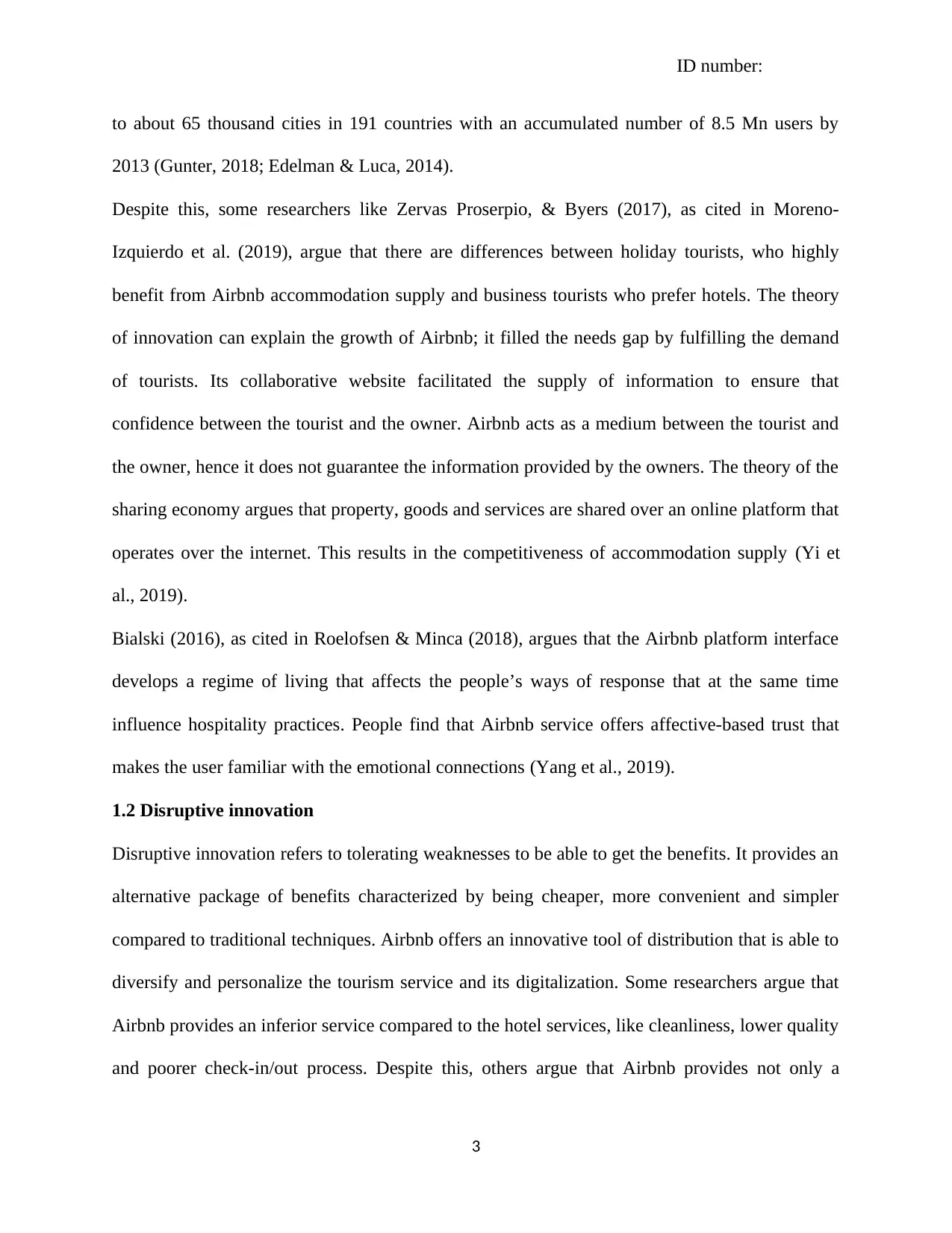
ID number:
to about 65 thousand cities in 191 countries with an accumulated number of 8.5 Mn users by
2013 (Gunter, 2018; Edelman & Luca, 2014).
Despite this, some researchers like Zervas Proserpio, & Byers (2017), as cited in Moreno-
Izquierdo et al. (2019), argue that there are differences between holiday tourists, who highly
benefit from Airbnb accommodation supply and business tourists who prefer hotels. The theory
of innovation can explain the growth of Airbnb; it filled the needs gap by fulfilling the demand
of tourists. Its collaborative website facilitated the supply of information to ensure that
confidence between the tourist and the owner. Airbnb acts as a medium between the tourist and
the owner, hence it does not guarantee the information provided by the owners. The theory of the
sharing economy argues that property, goods and services are shared over an online platform that
operates over the internet. This results in the competitiveness of accommodation supply (Yi et
al., 2019).
Bialski (2016), as cited in Roelofsen & Minca (2018), argues that the Airbnb platform interface
develops a regime of living that affects the people’s ways of response that at the same time
influence hospitality practices. People find that Airbnb service offers affective-based trust that
makes the user familiar with the emotional connections (Yang et al., 2019).
1.2 Disruptive innovation
Disruptive innovation refers to tolerating weaknesses to be able to get the benefits. It provides an
alternative package of benefits characterized by being cheaper, more convenient and simpler
compared to traditional techniques. Airbnb offers an innovative tool of distribution that is able to
diversify and personalize the tourism service and its digitalization. Some researchers argue that
Airbnb provides an inferior service compared to the hotel services, like cleanliness, lower quality
and poorer check-in/out process. Despite this, others argue that Airbnb provides not only a
3
to about 65 thousand cities in 191 countries with an accumulated number of 8.5 Mn users by
2013 (Gunter, 2018; Edelman & Luca, 2014).
Despite this, some researchers like Zervas Proserpio, & Byers (2017), as cited in Moreno-
Izquierdo et al. (2019), argue that there are differences between holiday tourists, who highly
benefit from Airbnb accommodation supply and business tourists who prefer hotels. The theory
of innovation can explain the growth of Airbnb; it filled the needs gap by fulfilling the demand
of tourists. Its collaborative website facilitated the supply of information to ensure that
confidence between the tourist and the owner. Airbnb acts as a medium between the tourist and
the owner, hence it does not guarantee the information provided by the owners. The theory of the
sharing economy argues that property, goods and services are shared over an online platform that
operates over the internet. This results in the competitiveness of accommodation supply (Yi et
al., 2019).
Bialski (2016), as cited in Roelofsen & Minca (2018), argues that the Airbnb platform interface
develops a regime of living that affects the people’s ways of response that at the same time
influence hospitality practices. People find that Airbnb service offers affective-based trust that
makes the user familiar with the emotional connections (Yang et al., 2019).
1.2 Disruptive innovation
Disruptive innovation refers to tolerating weaknesses to be able to get the benefits. It provides an
alternative package of benefits characterized by being cheaper, more convenient and simpler
compared to traditional techniques. Airbnb offers an innovative tool of distribution that is able to
diversify and personalize the tourism service and its digitalization. Some researchers argue that
Airbnb provides an inferior service compared to the hotel services, like cleanliness, lower quality
and poorer check-in/out process. Despite this, others argue that Airbnb provides not only a
3
Paraphrase This Document
Need a fresh take? Get an instant paraphrase of this document with our AI Paraphraser
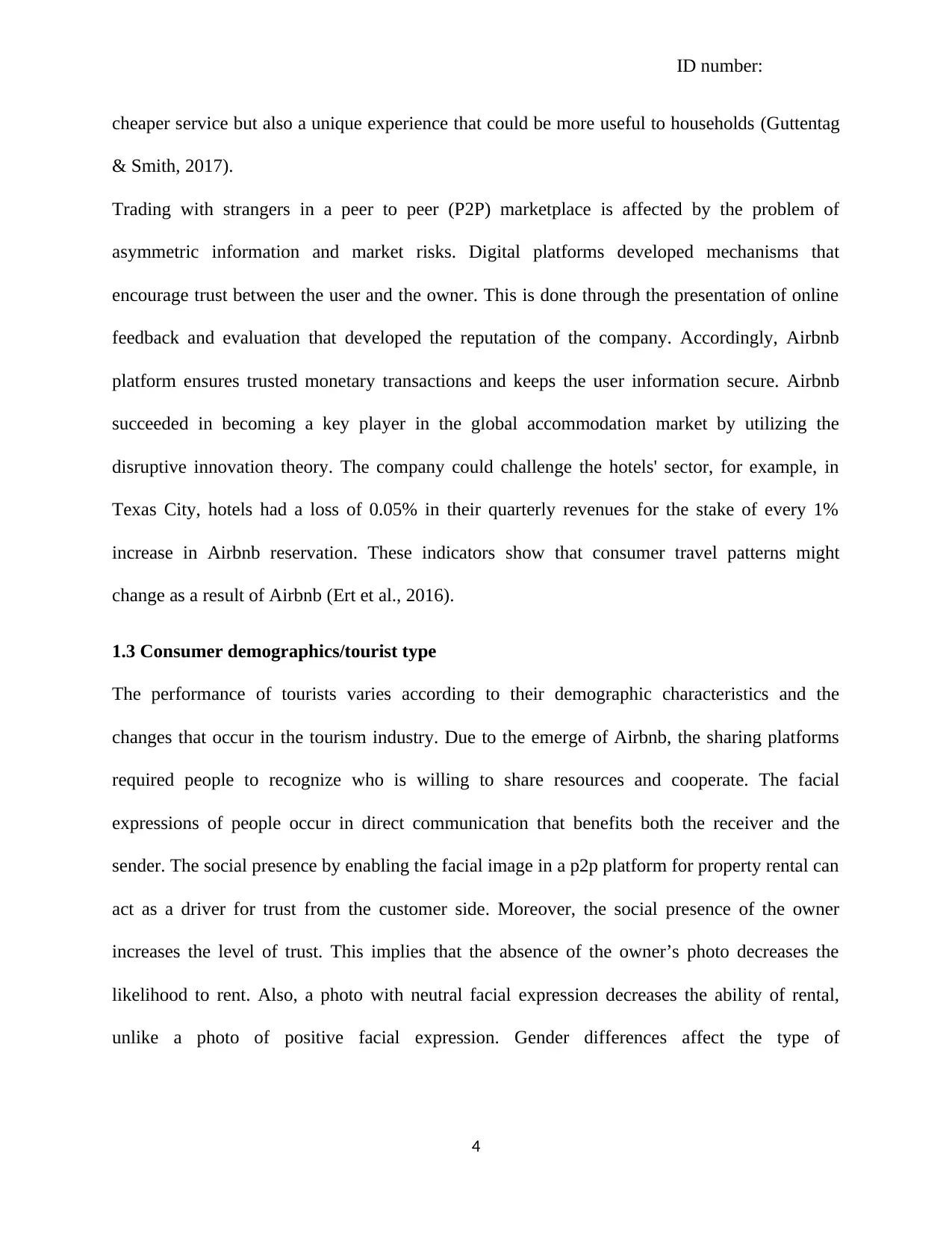
ID number:
cheaper service but also a unique experience that could be more useful to households (Guttentag
& Smith, 2017).
Trading with strangers in a peer to peer (P2P) marketplace is affected by the problem of
asymmetric information and market risks. Digital platforms developed mechanisms that
encourage trust between the user and the owner. This is done through the presentation of online
feedback and evaluation that developed the reputation of the company. Accordingly, Airbnb
platform ensures trusted monetary transactions and keeps the user information secure. Airbnb
succeeded in becoming a key player in the global accommodation market by utilizing the
disruptive innovation theory. The company could challenge the hotels' sector, for example, in
Texas City, hotels had a loss of 0.05% in their quarterly revenues for the stake of every 1%
increase in Airbnb reservation. These indicators show that consumer travel patterns might
change as a result of Airbnb (Ert et al., 2016).
1.3 Consumer demographics/tourist type
The performance of tourists varies according to their demographic characteristics and the
changes that occur in the tourism industry. Due to the emerge of Airbnb, the sharing platforms
required people to recognize who is willing to share resources and cooperate. The facial
expressions of people occur in direct communication that benefits both the receiver and the
sender. The social presence by enabling the facial image in a p2p platform for property rental can
act as a driver for trust from the customer side. Moreover, the social presence of the owner
increases the level of trust. This implies that the absence of the owner’s photo decreases the
likelihood to rent. Also, a photo with neutral facial expression decreases the ability of rental,
unlike a photo of positive facial expression. Gender differences affect the type of
4
cheaper service but also a unique experience that could be more useful to households (Guttentag
& Smith, 2017).
Trading with strangers in a peer to peer (P2P) marketplace is affected by the problem of
asymmetric information and market risks. Digital platforms developed mechanisms that
encourage trust between the user and the owner. This is done through the presentation of online
feedback and evaluation that developed the reputation of the company. Accordingly, Airbnb
platform ensures trusted monetary transactions and keeps the user information secure. Airbnb
succeeded in becoming a key player in the global accommodation market by utilizing the
disruptive innovation theory. The company could challenge the hotels' sector, for example, in
Texas City, hotels had a loss of 0.05% in their quarterly revenues for the stake of every 1%
increase in Airbnb reservation. These indicators show that consumer travel patterns might
change as a result of Airbnb (Ert et al., 2016).
1.3 Consumer demographics/tourist type
The performance of tourists varies according to their demographic characteristics and the
changes that occur in the tourism industry. Due to the emerge of Airbnb, the sharing platforms
required people to recognize who is willing to share resources and cooperate. The facial
expressions of people occur in direct communication that benefits both the receiver and the
sender. The social presence by enabling the facial image in a p2p platform for property rental can
act as a driver for trust from the customer side. Moreover, the social presence of the owner
increases the level of trust. This implies that the absence of the owner’s photo decreases the
likelihood to rent. Also, a photo with neutral facial expression decreases the ability of rental,
unlike a photo of positive facial expression. Gender differences affect the type of
4
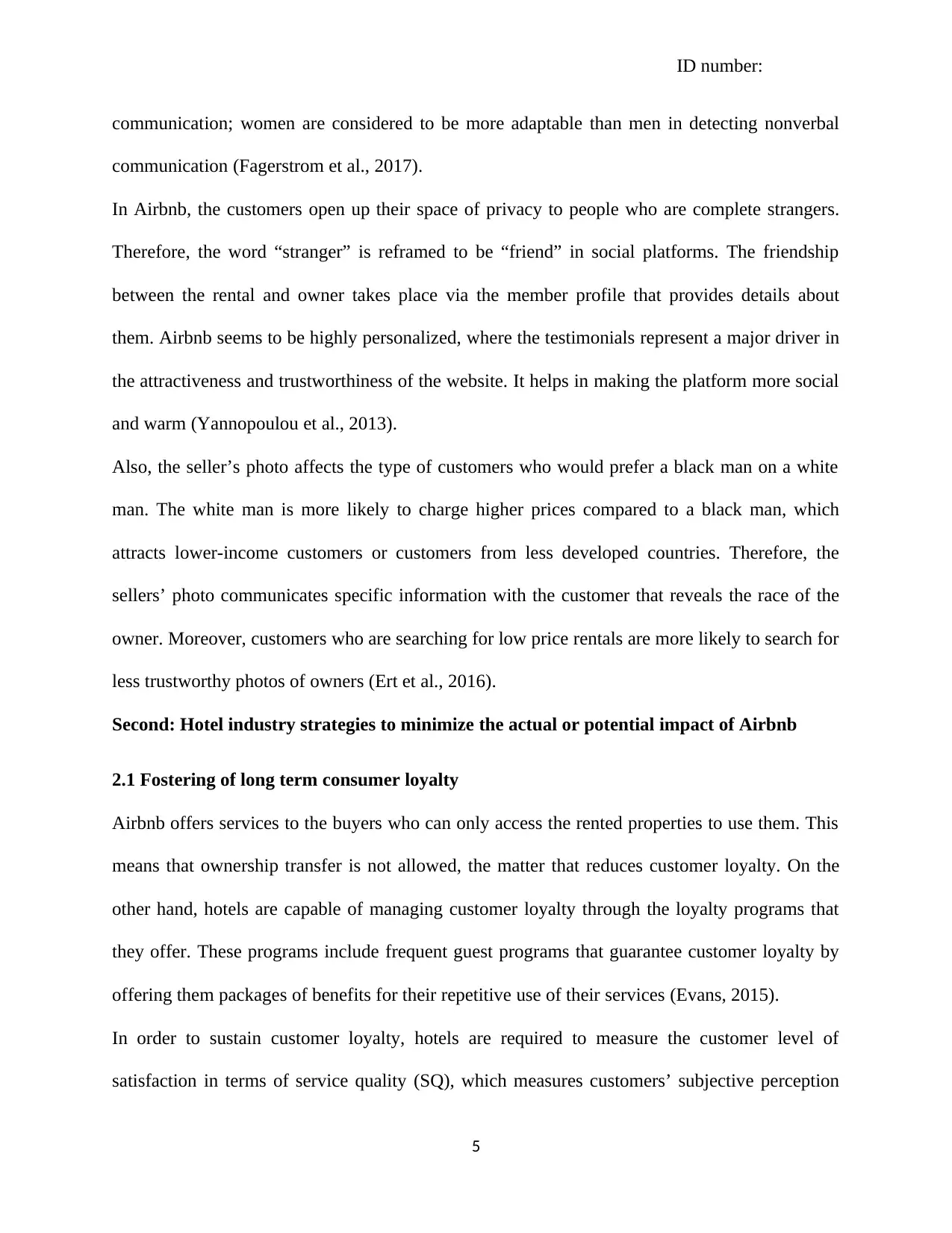
ID number:
communication; women are considered to be more adaptable than men in detecting nonverbal
communication (Fagerstrom et al., 2017).
In Airbnb, the customers open up their space of privacy to people who are complete strangers.
Therefore, the word “stranger” is reframed to be “friend” in social platforms. The friendship
between the rental and owner takes place via the member profile that provides details about
them. Airbnb seems to be highly personalized, where the testimonials represent a major driver in
the attractiveness and trustworthiness of the website. It helps in making the platform more social
and warm (Yannopoulou et al., 2013).
Also, the seller’s photo affects the type of customers who would prefer a black man on a white
man. The white man is more likely to charge higher prices compared to a black man, which
attracts lower-income customers or customers from less developed countries. Therefore, the
sellers’ photo communicates specific information with the customer that reveals the race of the
owner. Moreover, customers who are searching for low price rentals are more likely to search for
less trustworthy photos of owners (Ert et al., 2016).
Second: Hotel industry strategies to minimize the actual or potential impact of Airbnb
2.1 Fostering of long term consumer loyalty
Airbnb offers services to the buyers who can only access the rented properties to use them. This
means that ownership transfer is not allowed, the matter that reduces customer loyalty. On the
other hand, hotels are capable of managing customer loyalty through the loyalty programs that
they offer. These programs include frequent guest programs that guarantee customer loyalty by
offering them packages of benefits for their repetitive use of their services (Evans, 2015).
In order to sustain customer loyalty, hotels are required to measure the customer level of
satisfaction in terms of service quality (SQ), which measures customers’ subjective perception
5
communication; women are considered to be more adaptable than men in detecting nonverbal
communication (Fagerstrom et al., 2017).
In Airbnb, the customers open up their space of privacy to people who are complete strangers.
Therefore, the word “stranger” is reframed to be “friend” in social platforms. The friendship
between the rental and owner takes place via the member profile that provides details about
them. Airbnb seems to be highly personalized, where the testimonials represent a major driver in
the attractiveness and trustworthiness of the website. It helps in making the platform more social
and warm (Yannopoulou et al., 2013).
Also, the seller’s photo affects the type of customers who would prefer a black man on a white
man. The white man is more likely to charge higher prices compared to a black man, which
attracts lower-income customers or customers from less developed countries. Therefore, the
sellers’ photo communicates specific information with the customer that reveals the race of the
owner. Moreover, customers who are searching for low price rentals are more likely to search for
less trustworthy photos of owners (Ert et al., 2016).
Second: Hotel industry strategies to minimize the actual or potential impact of Airbnb
2.1 Fostering of long term consumer loyalty
Airbnb offers services to the buyers who can only access the rented properties to use them. This
means that ownership transfer is not allowed, the matter that reduces customer loyalty. On the
other hand, hotels are capable of managing customer loyalty through the loyalty programs that
they offer. These programs include frequent guest programs that guarantee customer loyalty by
offering them packages of benefits for their repetitive use of their services (Evans, 2015).
In order to sustain customer loyalty, hotels are required to measure the customer level of
satisfaction in terms of service quality (SQ), which measures customers’ subjective perception
5
⊘ This is a preview!⊘
Do you want full access?
Subscribe today to unlock all pages.

Trusted by 1+ million students worldwide
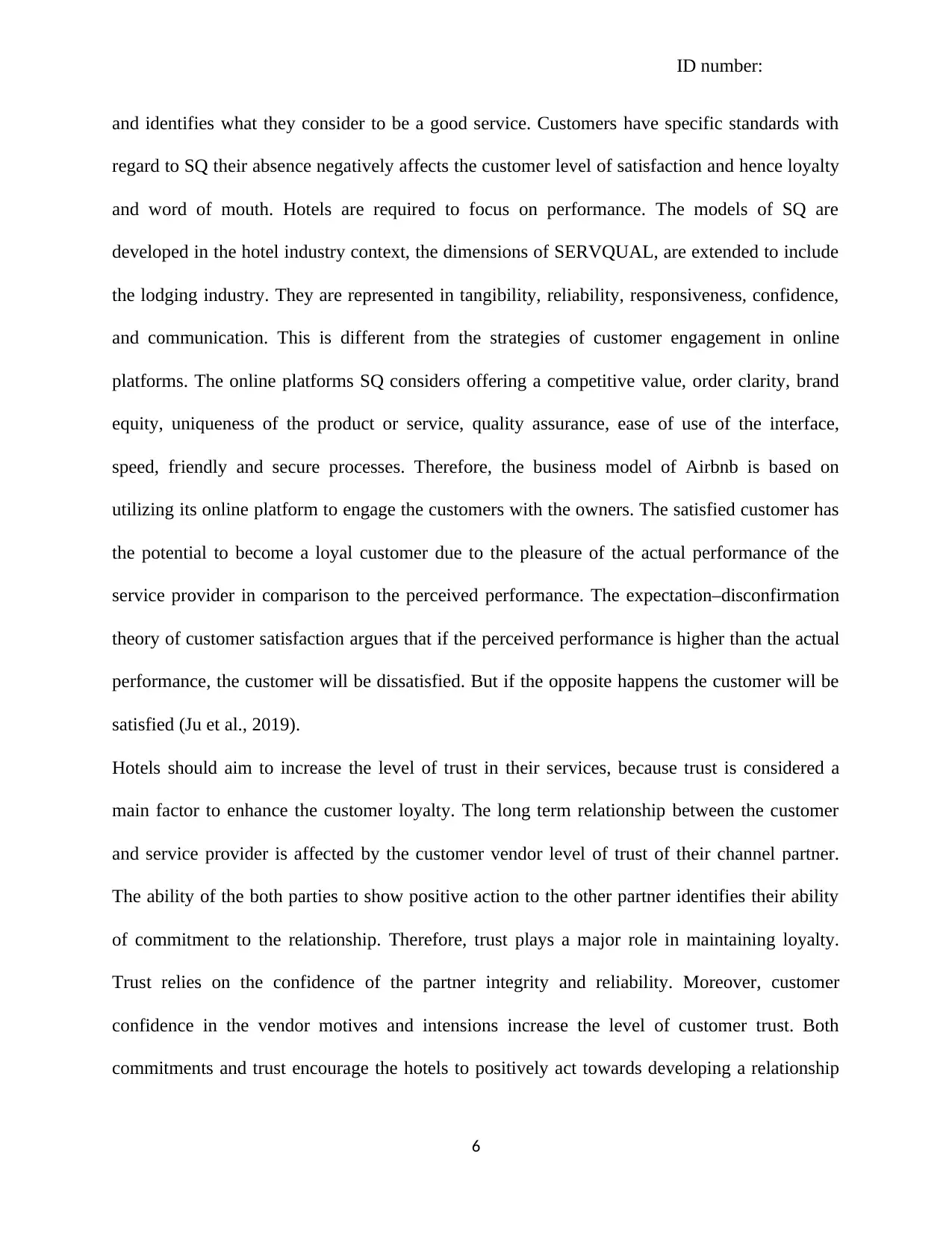
ID number:
and identifies what they consider to be a good service. Customers have specific standards with
regard to SQ their absence negatively affects the customer level of satisfaction and hence loyalty
and word of mouth. Hotels are required to focus on performance. The models of SQ are
developed in the hotel industry context, the dimensions of SERVQUAL, are extended to include
the lodging industry. They are represented in tangibility, reliability, responsiveness, confidence,
and communication. This is different from the strategies of customer engagement in online
platforms. The online platforms SQ considers offering a competitive value, order clarity, brand
equity, uniqueness of the product or service, quality assurance, ease of use of the interface,
speed, friendly and secure processes. Therefore, the business model of Airbnb is based on
utilizing its online platform to engage the customers with the owners. The satisfied customer has
the potential to become a loyal customer due to the pleasure of the actual performance of the
service provider in comparison to the perceived performance. The expectation–disconfirmation
theory of customer satisfaction argues that if the perceived performance is higher than the actual
performance, the customer will be dissatisfied. But if the opposite happens the customer will be
satisfied (Ju et al., 2019).
Hotels should aim to increase the level of trust in their services, because trust is considered a
main factor to enhance the customer loyalty. The long term relationship between the customer
and service provider is affected by the customer vendor level of trust of their channel partner.
The ability of the both parties to show positive action to the other partner identifies their ability
of commitment to the relationship. Therefore, trust plays a major role in maintaining loyalty.
Trust relies on the confidence of the partner integrity and reliability. Moreover, customer
confidence in the vendor motives and intensions increase the level of customer trust. Both
commitments and trust encourage the hotels to positively act towards developing a relationship
6
and identifies what they consider to be a good service. Customers have specific standards with
regard to SQ their absence negatively affects the customer level of satisfaction and hence loyalty
and word of mouth. Hotels are required to focus on performance. The models of SQ are
developed in the hotel industry context, the dimensions of SERVQUAL, are extended to include
the lodging industry. They are represented in tangibility, reliability, responsiveness, confidence,
and communication. This is different from the strategies of customer engagement in online
platforms. The online platforms SQ considers offering a competitive value, order clarity, brand
equity, uniqueness of the product or service, quality assurance, ease of use of the interface,
speed, friendly and secure processes. Therefore, the business model of Airbnb is based on
utilizing its online platform to engage the customers with the owners. The satisfied customer has
the potential to become a loyal customer due to the pleasure of the actual performance of the
service provider in comparison to the perceived performance. The expectation–disconfirmation
theory of customer satisfaction argues that if the perceived performance is higher than the actual
performance, the customer will be dissatisfied. But if the opposite happens the customer will be
satisfied (Ju et al., 2019).
Hotels should aim to increase the level of trust in their services, because trust is considered a
main factor to enhance the customer loyalty. The long term relationship between the customer
and service provider is affected by the customer vendor level of trust of their channel partner.
The ability of the both parties to show positive action to the other partner identifies their ability
of commitment to the relationship. Therefore, trust plays a major role in maintaining loyalty.
Trust relies on the confidence of the partner integrity and reliability. Moreover, customer
confidence in the vendor motives and intensions increase the level of customer trust. Both
commitments and trust encourage the hotels to positively act towards developing a relationship
6
Paraphrase This Document
Need a fresh take? Get an instant paraphrase of this document with our AI Paraphraser
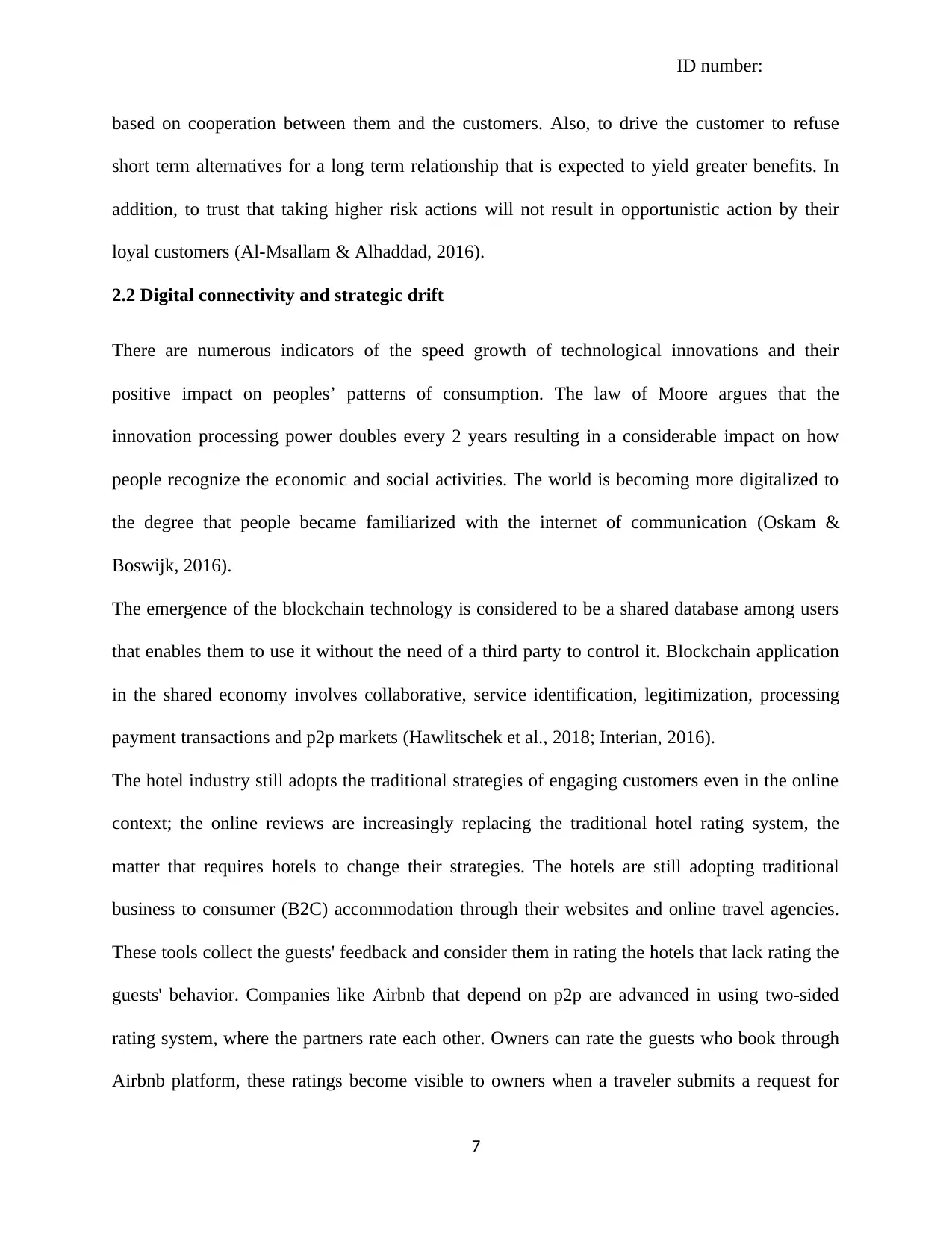
ID number:
based on cooperation between them and the customers. Also, to drive the customer to refuse
short term alternatives for a long term relationship that is expected to yield greater benefits. In
addition, to trust that taking higher risk actions will not result in opportunistic action by their
loyal customers (Al-Msallam & Alhaddad, 2016).
2.2 Digital connectivity and strategic drift
There are numerous indicators of the speed growth of technological innovations and their
positive impact on peoples’ patterns of consumption. The law of Moore argues that the
innovation processing power doubles every 2 years resulting in a considerable impact on how
people recognize the economic and social activities. The world is becoming more digitalized to
the degree that people became familiarized with the internet of communication (Oskam &
Boswijk, 2016).
The emergence of the blockchain technology is considered to be a shared database among users
that enables them to use it without the need of a third party to control it. Blockchain application
in the shared economy involves collaborative, service identification, legitimization, processing
payment transactions and p2p markets (Hawlitschek et al., 2018; Interian, 2016).
The hotel industry still adopts the traditional strategies of engaging customers even in the online
context; the online reviews are increasingly replacing the traditional hotel rating system, the
matter that requires hotels to change their strategies. The hotels are still adopting traditional
business to consumer (B2C) accommodation through their websites and online travel agencies.
These tools collect the guests' feedback and consider them in rating the hotels that lack rating the
guests' behavior. Companies like Airbnb that depend on p2p are advanced in using two-sided
rating system, where the partners rate each other. Owners can rate the guests who book through
Airbnb platform, these ratings become visible to owners when a traveler submits a request for
7
based on cooperation between them and the customers. Also, to drive the customer to refuse
short term alternatives for a long term relationship that is expected to yield greater benefits. In
addition, to trust that taking higher risk actions will not result in opportunistic action by their
loyal customers (Al-Msallam & Alhaddad, 2016).
2.2 Digital connectivity and strategic drift
There are numerous indicators of the speed growth of technological innovations and their
positive impact on peoples’ patterns of consumption. The law of Moore argues that the
innovation processing power doubles every 2 years resulting in a considerable impact on how
people recognize the economic and social activities. The world is becoming more digitalized to
the degree that people became familiarized with the internet of communication (Oskam &
Boswijk, 2016).
The emergence of the blockchain technology is considered to be a shared database among users
that enables them to use it without the need of a third party to control it. Blockchain application
in the shared economy involves collaborative, service identification, legitimization, processing
payment transactions and p2p markets (Hawlitschek et al., 2018; Interian, 2016).
The hotel industry still adopts the traditional strategies of engaging customers even in the online
context; the online reviews are increasingly replacing the traditional hotel rating system, the
matter that requires hotels to change their strategies. The hotels are still adopting traditional
business to consumer (B2C) accommodation through their websites and online travel agencies.
These tools collect the guests' feedback and consider them in rating the hotels that lack rating the
guests' behavior. Companies like Airbnb that depend on p2p are advanced in using two-sided
rating system, where the partners rate each other. Owners can rate the guests who book through
Airbnb platform, these ratings become visible to owners when a traveler submits a request for
7
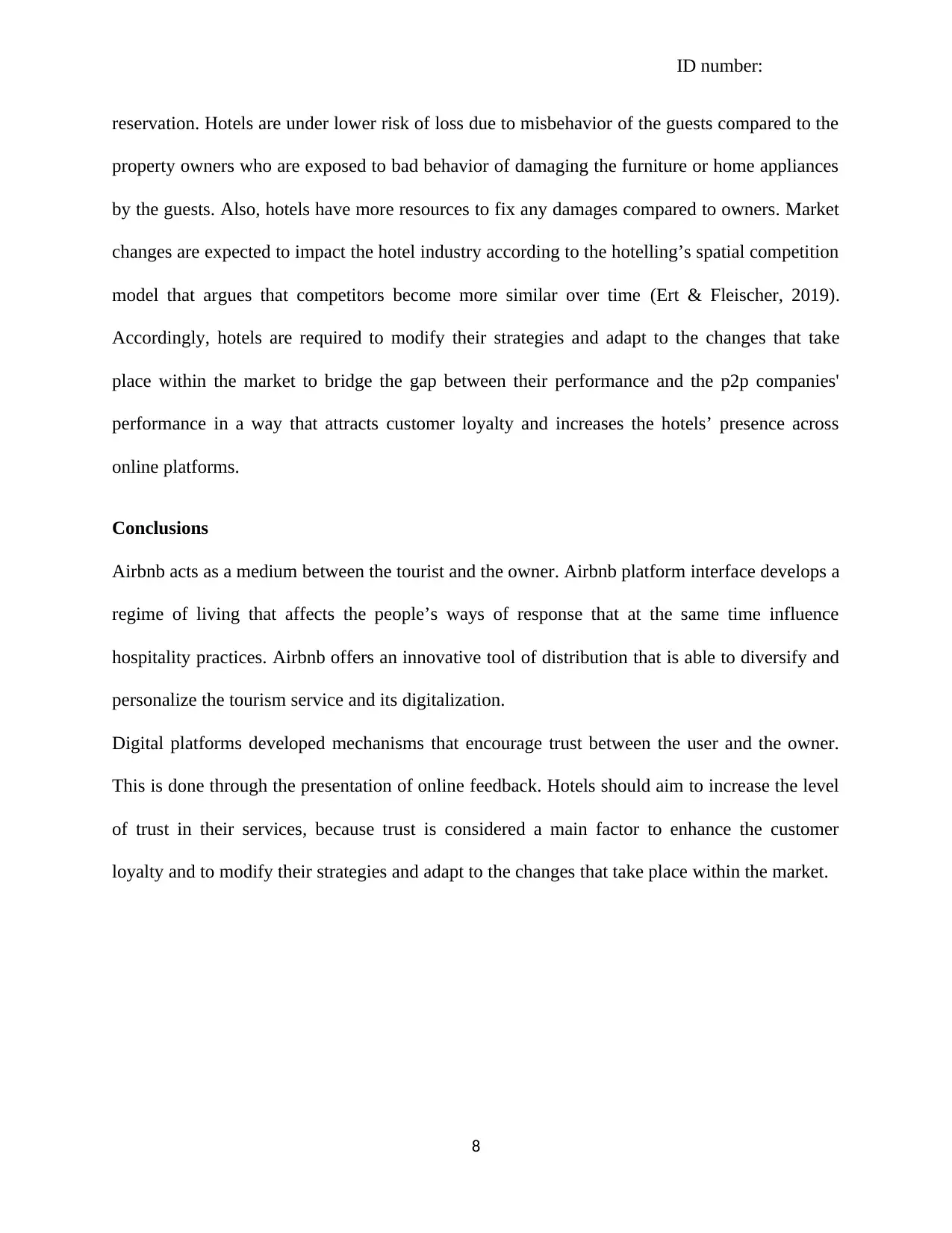
ID number:
reservation. Hotels are under lower risk of loss due to misbehavior of the guests compared to the
property owners who are exposed to bad behavior of damaging the furniture or home appliances
by the guests. Also, hotels have more resources to fix any damages compared to owners. Market
changes are expected to impact the hotel industry according to the hotelling’s spatial competition
model that argues that competitors become more similar over time (Ert & Fleischer, 2019).
Accordingly, hotels are required to modify their strategies and adapt to the changes that take
place within the market to bridge the gap between their performance and the p2p companies'
performance in a way that attracts customer loyalty and increases the hotels’ presence across
online platforms.
Conclusions
Airbnb acts as a medium between the tourist and the owner. Airbnb platform interface develops a
regime of living that affects the people’s ways of response that at the same time influence
hospitality practices. Airbnb offers an innovative tool of distribution that is able to diversify and
personalize the tourism service and its digitalization.
Digital platforms developed mechanisms that encourage trust between the user and the owner.
This is done through the presentation of online feedback. Hotels should aim to increase the level
of trust in their services, because trust is considered a main factor to enhance the customer
loyalty and to modify their strategies and adapt to the changes that take place within the market.
8
reservation. Hotels are under lower risk of loss due to misbehavior of the guests compared to the
property owners who are exposed to bad behavior of damaging the furniture or home appliances
by the guests. Also, hotels have more resources to fix any damages compared to owners. Market
changes are expected to impact the hotel industry according to the hotelling’s spatial competition
model that argues that competitors become more similar over time (Ert & Fleischer, 2019).
Accordingly, hotels are required to modify their strategies and adapt to the changes that take
place within the market to bridge the gap between their performance and the p2p companies'
performance in a way that attracts customer loyalty and increases the hotels’ presence across
online platforms.
Conclusions
Airbnb acts as a medium between the tourist and the owner. Airbnb platform interface develops a
regime of living that affects the people’s ways of response that at the same time influence
hospitality practices. Airbnb offers an innovative tool of distribution that is able to diversify and
personalize the tourism service and its digitalization.
Digital platforms developed mechanisms that encourage trust between the user and the owner.
This is done through the presentation of online feedback. Hotels should aim to increase the level
of trust in their services, because trust is considered a main factor to enhance the customer
loyalty and to modify their strategies and adapt to the changes that take place within the market.
8
⊘ This is a preview!⊘
Do you want full access?
Subscribe today to unlock all pages.

Trusted by 1+ million students worldwide
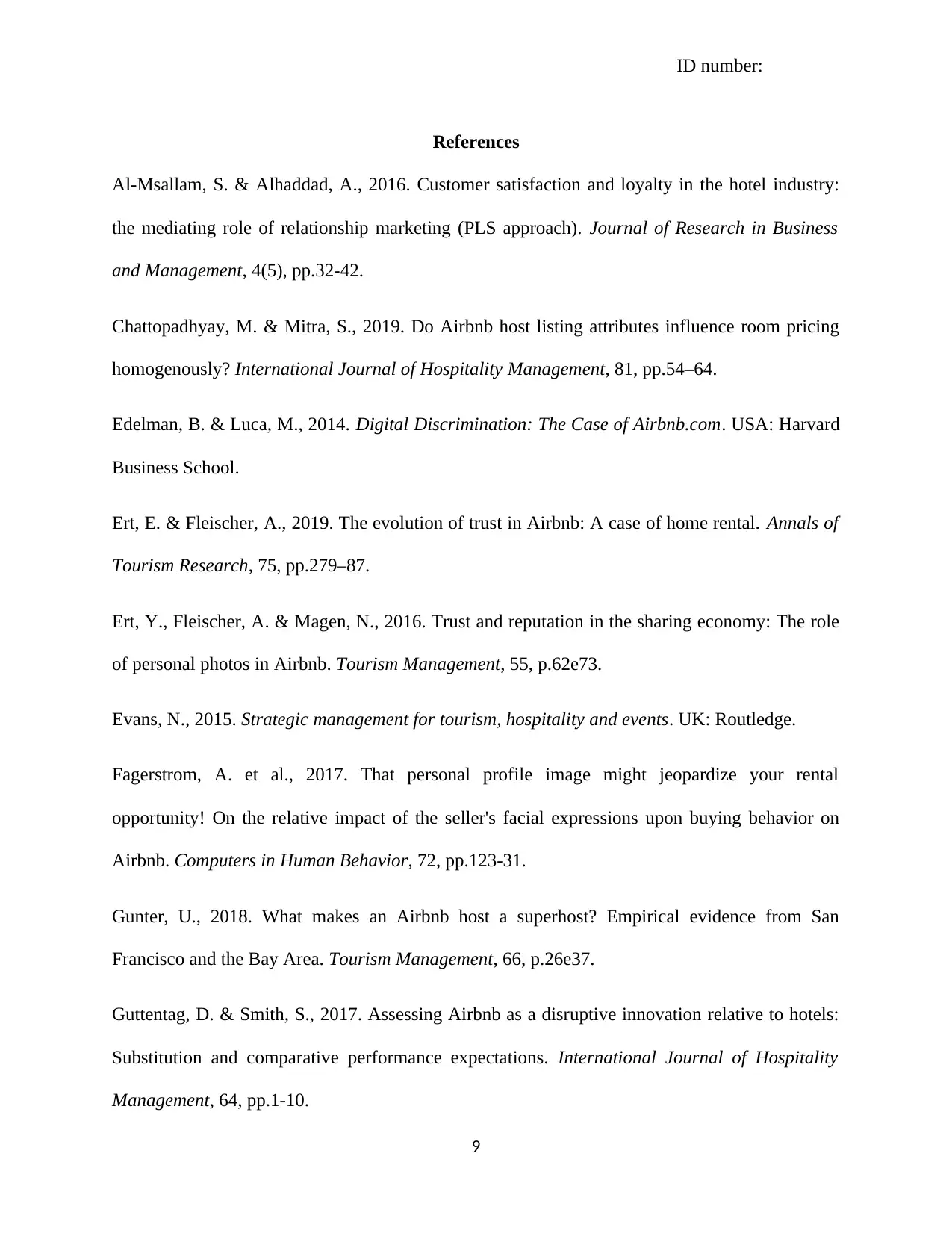
ID number:
References
Al-Msallam, S. & Alhaddad, A., 2016. Customer satisfaction and loyalty in the hotel industry:
the mediating role of relationship marketing (PLS approach). Journal of Research in Business
and Management, 4(5), pp.32-42.
Chattopadhyay, M. & Mitra, S., 2019. Do Airbnb host listing attributes influence room pricing
homogenously? International Journal of Hospitality Management, 81, pp.54–64.
Edelman, B. & Luca, M., 2014. Digital Discrimination: The Case of Airbnb.com. USA: Harvard
Business School.
Ert, E. & Fleischer, A., 2019. The evolution of trust in Airbnb: A case of home rental. Annals of
Tourism Research, 75, pp.279–87.
Ert, Y., Fleischer, A. & Magen, N., 2016. Trust and reputation in the sharing economy: The role
of personal photos in Airbnb. Tourism Management, 55, p.62e73.
Evans, N., 2015. Strategic management for tourism, hospitality and events. UK: Routledge.
Fagerstrom, A. et al., 2017. That personal profile image might jeopardize your rental
opportunity! On the relative impact of the seller's facial expressions upon buying behavior on
Airbnb. Computers in Human Behavior, 72, pp.123-31.
Gunter, U., 2018. What makes an Airbnb host a superhost? Empirical evidence from San
Francisco and the Bay Area. Tourism Management, 66, p.26e37.
Guttentag, D. & Smith, S., 2017. Assessing Airbnb as a disruptive innovation relative to hotels:
Substitution and comparative performance expectations. International Journal of Hospitality
Management, 64, pp.1-10.
9
References
Al-Msallam, S. & Alhaddad, A., 2016. Customer satisfaction and loyalty in the hotel industry:
the mediating role of relationship marketing (PLS approach). Journal of Research in Business
and Management, 4(5), pp.32-42.
Chattopadhyay, M. & Mitra, S., 2019. Do Airbnb host listing attributes influence room pricing
homogenously? International Journal of Hospitality Management, 81, pp.54–64.
Edelman, B. & Luca, M., 2014. Digital Discrimination: The Case of Airbnb.com. USA: Harvard
Business School.
Ert, E. & Fleischer, A., 2019. The evolution of trust in Airbnb: A case of home rental. Annals of
Tourism Research, 75, pp.279–87.
Ert, Y., Fleischer, A. & Magen, N., 2016. Trust and reputation in the sharing economy: The role
of personal photos in Airbnb. Tourism Management, 55, p.62e73.
Evans, N., 2015. Strategic management for tourism, hospitality and events. UK: Routledge.
Fagerstrom, A. et al., 2017. That personal profile image might jeopardize your rental
opportunity! On the relative impact of the seller's facial expressions upon buying behavior on
Airbnb. Computers in Human Behavior, 72, pp.123-31.
Gunter, U., 2018. What makes an Airbnb host a superhost? Empirical evidence from San
Francisco and the Bay Area. Tourism Management, 66, p.26e37.
Guttentag, D. & Smith, S., 2017. Assessing Airbnb as a disruptive innovation relative to hotels:
Substitution and comparative performance expectations. International Journal of Hospitality
Management, 64, pp.1-10.
9
Paraphrase This Document
Need a fresh take? Get an instant paraphrase of this document with our AI Paraphraser
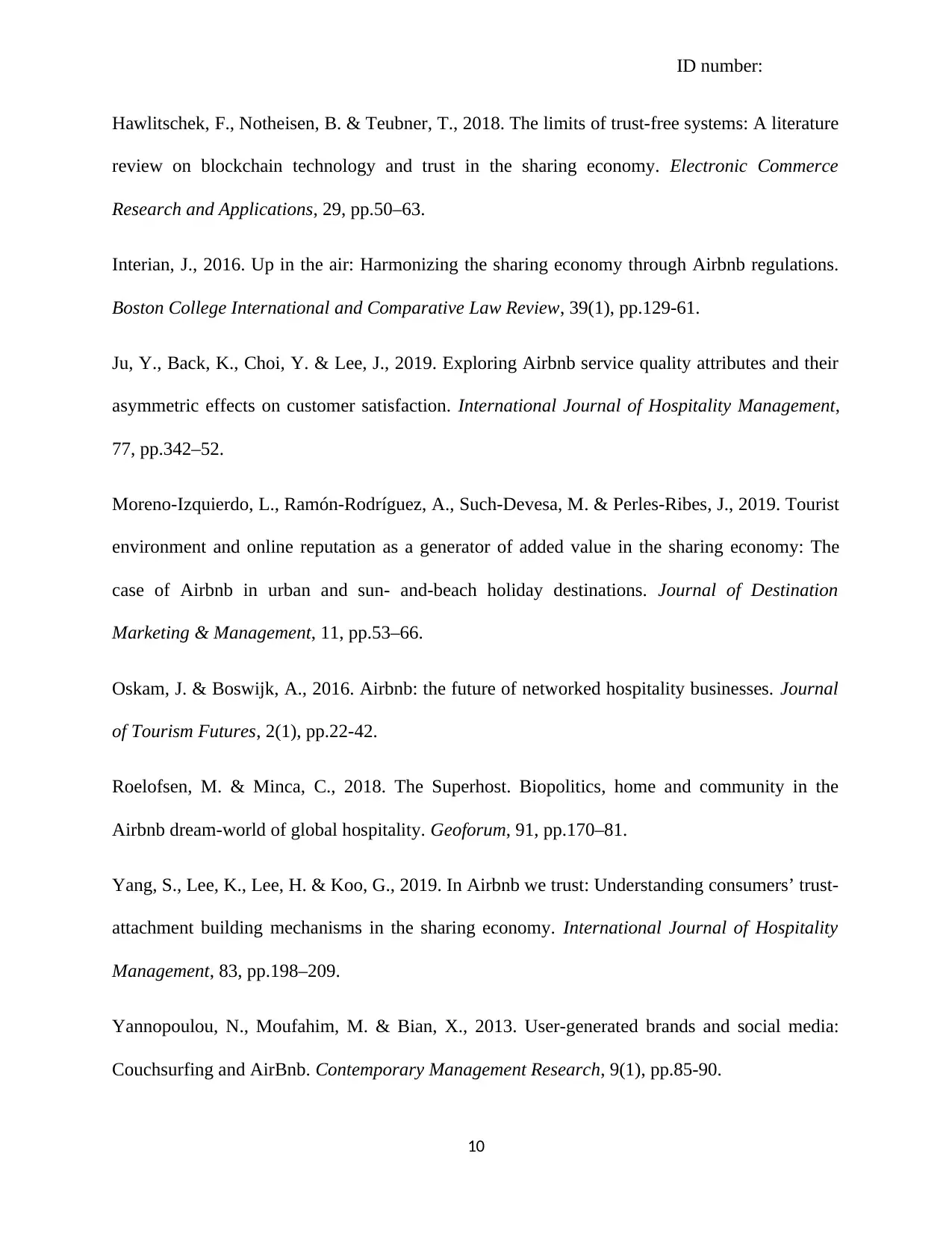
ID number:
Hawlitschek, F., Notheisen, B. & Teubner, T., 2018. The limits of trust-free systems: A literature
review on blockchain technology and trust in the sharing economy. Electronic Commerce
Research and Applications, 29, pp.50–63.
Interian, J., 2016. Up in the air: Harmonizing the sharing economy through Airbnb regulations.
Boston College International and Comparative Law Review, 39(1), pp.129-61.
Ju, Y., Back, K., Choi, Y. & Lee, J., 2019. Exploring Airbnb service quality attributes and their
asymmetric effects on customer satisfaction. International Journal of Hospitality Management,
77, pp.342–52.
Moreno-Izquierdo, L., Ramón-Rodríguez, A., Such-Devesa, M. & Perles-Ribes, J., 2019. Tourist
environment and online reputation as a generator of added value in the sharing economy: The
case of Airbnb in urban and sun- and-beach holiday destinations. Journal of Destination
Marketing & Management, 11, pp.53–66.
Oskam, J. & Boswijk, A., 2016. Airbnb: the future of networked hospitality businesses. Journal
of Tourism Futures, 2(1), pp.22-42.
Roelofsen, M. & Minca, C., 2018. The Superhost. Biopolitics, home and community in the
Airbnb dream-world of global hospitality. Geoforum, 91, pp.170–81.
Yang, S., Lee, K., Lee, H. & Koo, G., 2019. In Airbnb we trust: Understanding consumers’ trust-
attachment building mechanisms in the sharing economy. International Journal of Hospitality
Management, 83, pp.198–209.
Yannopoulou, N., Moufahim, M. & Bian, X., 2013. User-generated brands and social media:
Couchsurfing and AirBnb. Contemporary Management Research, 9(1), pp.85-90.
10
Hawlitschek, F., Notheisen, B. & Teubner, T., 2018. The limits of trust-free systems: A literature
review on blockchain technology and trust in the sharing economy. Electronic Commerce
Research and Applications, 29, pp.50–63.
Interian, J., 2016. Up in the air: Harmonizing the sharing economy through Airbnb regulations.
Boston College International and Comparative Law Review, 39(1), pp.129-61.
Ju, Y., Back, K., Choi, Y. & Lee, J., 2019. Exploring Airbnb service quality attributes and their
asymmetric effects on customer satisfaction. International Journal of Hospitality Management,
77, pp.342–52.
Moreno-Izquierdo, L., Ramón-Rodríguez, A., Such-Devesa, M. & Perles-Ribes, J., 2019. Tourist
environment and online reputation as a generator of added value in the sharing economy: The
case of Airbnb in urban and sun- and-beach holiday destinations. Journal of Destination
Marketing & Management, 11, pp.53–66.
Oskam, J. & Boswijk, A., 2016. Airbnb: the future of networked hospitality businesses. Journal
of Tourism Futures, 2(1), pp.22-42.
Roelofsen, M. & Minca, C., 2018. The Superhost. Biopolitics, home and community in the
Airbnb dream-world of global hospitality. Geoforum, 91, pp.170–81.
Yang, S., Lee, K., Lee, H. & Koo, G., 2019. In Airbnb we trust: Understanding consumers’ trust-
attachment building mechanisms in the sharing economy. International Journal of Hospitality
Management, 83, pp.198–209.
Yannopoulou, N., Moufahim, M. & Bian, X., 2013. User-generated brands and social media:
Couchsurfing and AirBnb. Contemporary Management Research, 9(1), pp.85-90.
10

ID number:
Yi, J., Yuan, G. & Yoo, C., 2019. The effect of the perceived risk on the adoption of the sharing
economy in the tourism industry: The case of Airbnb. Information Processing and Management,
pp.1-11.
11
Yi, J., Yuan, G. & Yoo, C., 2019. The effect of the perceived risk on the adoption of the sharing
economy in the tourism industry: The case of Airbnb. Information Processing and Management,
pp.1-11.
11
⊘ This is a preview!⊘
Do you want full access?
Subscribe today to unlock all pages.

Trusted by 1+ million students worldwide
1 out of 12
Related Documents
Your All-in-One AI-Powered Toolkit for Academic Success.
+13062052269
info@desklib.com
Available 24*7 on WhatsApp / Email
![[object Object]](/_next/static/media/star-bottom.7253800d.svg)
Unlock your academic potential
Copyright © 2020–2026 A2Z Services. All Rights Reserved. Developed and managed by ZUCOL.





